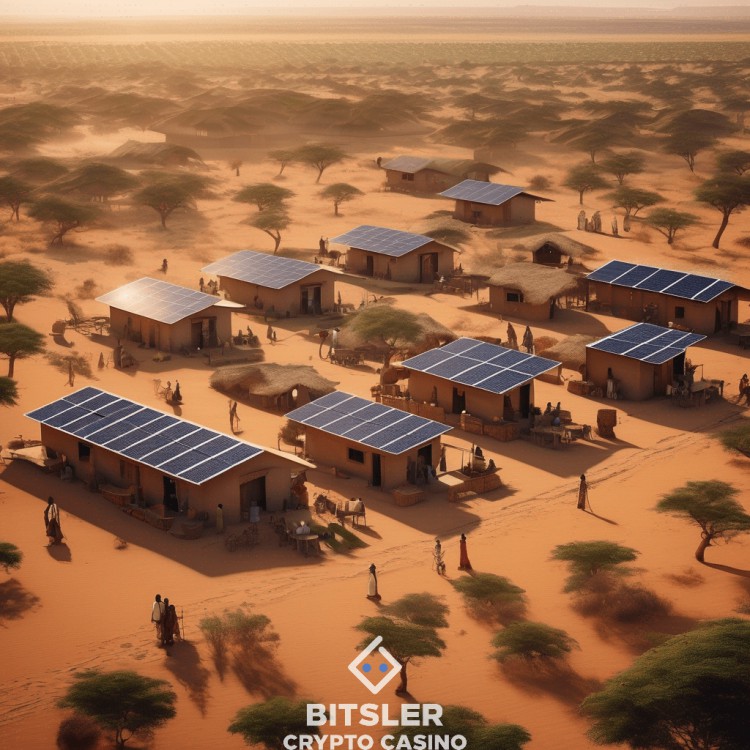
邦多是馬拉威靠近莫三比克邊境的一個偏遠地區的一個分散的村莊群。 它坐落在姆蘭傑山山麓,居民依靠雙腳進行交通運輸,並靠著種植一些農作物來養家。 然而,與這個貧困國家的大多數地方不同的是,當夜幕降臨時,他們現在可以打開家裡的燈、爐灶和電視。
邦多電力已經抵達。 在利用肥沃地區降雨的微型水力發電計畫中安裝了三台渦輪機。 迄今為止,已連接迷你電網的 1,800 戶家庭的生活已經改變了。 孩子們可以在天黑後學習,因此現在有更好的機會通過中學考試,而不是 11 歲就必須離開。藥品和食物可以存放在冰箱中,因此村民不必長途跋涉 12 英里才能到達目的地。醫院,可以生產大量食品或飲料在市場上出售。 煮飯的速度快三倍,對環境的破壞也小得多,而且無需收集柴火。
當我問一群婦女家裡是否有電視和看足球比賽時,她們咯咯地笑起來。 「以前,我們的丈夫會說他們要去看足球,但實際上他們正在和其他女人一起出去。 現在他們不能再聲稱自己要去踢足球了,」伯莎告訴我。 高級酋長告訴我,他們從來沒有夢想過能夠為村莊提供能源,十幾家玉米加工廠、許多小型企業、學校、商店和教堂也接入了電網。 “當你在邦多走動時,你會看到快樂的人們——這都是因為電力。”
然而,邦多的巨大驚喜不僅僅是為這樣一個孤立的社區提供能源,在這個只有八分之一的公民能用上電網的國家,在這片12 億人口中近一半仍然缺乏這種改變生活的大陸上供應。 真正讓人大開眼界的是混凝土泵房內堆放的32台電腦。 這個創新的迷你電網距離馬拉威第二大城市布蘭太爾有兩個多小時的路程,道路崎嶇不平,在傾盆大雨中可能無法通行,它正在開採比特幣為其運營提供資金。
It is a smart idea. The computers used to create valuable new Bitcoin tokens and validate transactions consume around the same amount of energy as a medium-sized country such as Sweden would generate. Hence the stinging critique of how this cryptocurrency wastes the planet’s precious resources. This initiative flips that narrative by using Bitcoin mining to fund energy in parts of Africa that are too poor or remote to merit connection to grids, but which do have plentiful supplies of potential power sources. Mining soaks up the excess energy of these renewable plants. And this delivers not just electricity but a powerful jolt to to drive development in the local economy.
The concept comes from a Kenyan firm, Gridless, set up in 2022, whose backers include Twitter founder Jack Dorsey. There are four other sites in Kenya and Zambia and plans for scores more across the continent. Its aim is to demonstrate how Africa could play a central role in countering the conventional belief that Bitcoin, now 15 years old, is used simply for risky speculation and dodgy transactions. Instead, it backs those who claim it will lead to more inclusive financial systems as it usurps the control of dysfunctional governments and manipulative central banks.
It will also release the community from reliance on foreign handouts to survive. The Bondo power plants were built by Mount Mulanje Conservation Trust, a local group trying to protect the mountain region’s unique bio-diversity, and were initially supported by finance from aid and development agencies — but now Bitcoin covers the running costs. This offers a commercial incentive that does not rely on altruism or subsidies to deliver power to remote regions, while exploiting energy waste at times of low use such as overnight.
Malawi, one of the world’s poorest nations, provides a powerful case study in the failures of aid. As former development minister Rory Stewart said in a lecture at Yale, Britain gave £4.5billion over half a century to this southern African country corroded by corruption and bad governance, yet it ended up “if anything, poorer than it was when we started”.
“Bitcoin can prevent Bondo becoming the sort of white elephant that you see across Africa, built by aid groups and then abandoned,” said Erik Hersman, chief executive of Gridless. He admits that he is “not a big fan” of the sector. “They come in with low-cost loans and grants to finance all these schemes that they say will pay their way in 30 years but the sums never add up. This is a new way to finance development.”
Malawi also demonstrates another reason why there is rising interest in Bitcoin in Africa: people are seeking a safer home for their cash than local currencies. Prices rose sharply after its currency was devalued two months ago by 44% against the US dollar — the second decrease in value of the kwacha in 18 months. Many African countries on the continent have suffered also from catastrophic inflation, while official currency conversion rates can be significantly lower than street rates.
One Kenyan entrepreneur told me she turned to the cryptocurrency after seeing her savings constantly eroded even in a country with lower than average inflation for the continent. “I was trying to save to buy a house but kept finding my sums declining. I wanted more stability so tried Bitcoin, and then found it had other uses,” said Marcel Lorraine, founder of Bitcoin DADA. Her clients include a trader of alternative health products in a Nairobi street market, who found it much cheaper to use than changing currencies after being introduced to it by a Nigerian customer and is now hoping it will provide a stable platform for building her business to obtain a shop.
While Warren Buffet dismissed Bitcoin as “probably rat poison squared” and the economist Paul Krugman has compared it to a Ponzi scam fuelled by libertarian fantasies and “technobabble”, devotees see it as a liberating force due to the decentralised design created by its mysterious and pseudonymous creator, Satoshi Nakamoto. BlackRock, the world’s biggest asset manager, has even applied to launch a Bitcoin exchange-traded fund that may open up the market to the US wealth management industry.
Certainly Bitcoin, for all its fluctuations, can seem comparatively reliable if you live in Africa — or indeed many other parts of the planet, from Argentina to Lebanon. “This is what I have seen everywhere,” said Peter McCormack, who travels the world for a Bitcoin podcast. “Here is an alternative to gold and property for a middle class that has some money and patience, but is seeing expenses and costs rise while savings decline in value. And a strong middle class helps build a strong economy by driving consumer spending, reducing reliance on the state and driving innovation and entrepreneurship.”
Bitcoin has also become a helpful tool for activists and journalists in dictatorships, since it makes it far harder to track funds. In Togo, a West African state run by one despotic family since 1967, it is used to channel cash to opposition and civil society leaders despite the freezing of bank accounts. Bitcoin has been instrumental in delivering donations to Alexei Navalny’s Anti-Corruption Foundation in Russia and the pro-democracy movements in Belarus and Myanmar.
人權基金會首席策略長、一本書的作者亞歷克斯·格拉德斯坦(Alex Gladstein)認為,比特幣提供了擺脫陳舊貨幣體系和政治衝突的自由 , 他認為加密貨幣對非洲人來說尤其令人興奮,因為他們遭受了「各種金融壓制」。 他指出,非洲大陸有 45 種貨幣(其中 15 種仍由法國控制),兌換交易的交易費用很高,這些交易主要由匯率波動劇烈的西方公司處理。 「比特幣為非洲人提供了一種逃避和替代方案,而其使用並不像一些人想像的那樣受到限制,」他說。 “那裡的企業家已經弄清楚了沒有互聯網的人如何使用比特幣,坦率地說,這非常了不起。”
這種敏捷性是整個非洲技術創新爆發的典型特徵,其驅動力是年輕、快速成長且教育程度不斷提高的人口。 去年年底在加納舉行的第二屆非洲比特幣會議上,一位關鍵人物表示:「比特幣的美妙之處在於,它是一種自下而上的技術,並且在各個層面上都得到了真正的採用。”
只有時間才能證明中本聰的發明是否會成為一個帶來不良後果的泡沫,或者像樂觀主義者所認為的那樣,成為世界深刻變革的驅動力。 經營全球最大加密貨幣交易所之一的山姆·班克曼-弗里德(Sam Bankman-Fried) 被判欺詐罪,以及另一家大型交易所老闆承認洗錢,這損害了西方許多人的加密貨幣聲譽。 但比特幣似乎確實為飽受獨裁、殖民主義、軍事政變和糟糕治理所傷痕累累的社會提供了一些積極的東西——正如馬拉維農村一個混凝土棚裡的那些計算機將水轉化為現金流來為電力提供資金一樣。
